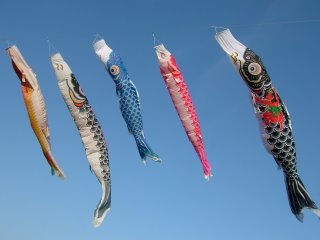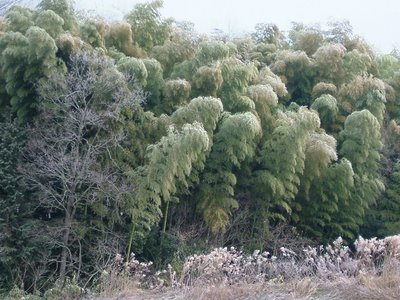Japanese dialects and Hiroshima-ben
Between the ages of nine and fourteen I lived in Plymouth, England. I spoke like most Plymothians did - with an inadvertent love for the letter 'r', unhurried speech, and lengthened vowels. I thought nothing of shopkeepers greeting me with "Awwwrrrrright my luvvverrr", nor of them taking a full ten seconds to get from the first syllable to the last; and no local would be seen dead uttering the standard (grockle) question, "Where is it?" - Plymothians used the far superior "Where's it to?"
I had little inkling at that time that people from other parts of the world might find this speech odd, or country-bumpkinish, or that it could become the subject of fun or derision.
I moved to Gloucestershire when I was fourteen. On my first day at a new school, I entered my classroom with new-boy nerves. I kept my head low, surreptitiously surveying my new, black-blazered classmates. The bearded teacher called the register. The boys answered, "Here", in turn. Nothing unusual or out-of-the-ordinary. When my name was called I did likewise, yet somehow I was unable to shorten my vowels or strangle that 'r'. "Heeerrrre", I said. The teacher looked up from his register with (what I now take to be) a benevolent smile on his face; in unison my new classmates gleefully chorused an excruciatingly elongated, "OOOO-AARRRRR, OOOO-AARRRRR!"
I lost my Plymouth r's, my elongated vowels, and my slower speech pretty quickly - and with it my Plymothian identity. Moving does that to you when you're a child.
Here in Japan, there are a wealth of dialects, stretching from the far north to the islands way down south.
My children lived for five years in Kyoto. They spoke their Japanese with the flavourings of a Kyoto dialect (Kyoto-ben). Everything was ika-haru (I'll go) and ika-hen (I won't go). They were full of okini (thanks) in the shops, and were welcomed home by neighbours with okaeriyasu (welcome home).
Then, after those five years, we moved to the countryside of Hiroshima. My children started to speak a mixture of Kyoto-ben and Hiroshima-ben. It was an interesting few months linguistically, and probably a pretty strange mix for Japanese to listen to. Now, they speak exclusively Hiroshima-ben; they're all buchi and jaken, and the linguistic influences of Kyoto are long forgotten.
I have a pretty firm grasp, now, of what people from various parts of Britain think of accents and dialects from other parts of the country. But, despite being here in Japan for a fair few years, I am still pretty shaky on which dialects are the subject of derision, which are held in somewhat higher esteem, and which, if any, are revered. Of course, we all know what the Osakans think of the Tokyoites and their speech patterns (and vice versa), but what do they feel about Hiroshima-ben? What do people in Kagoshima think about those up north? Is Kyoto-ben really the bee's knees? To find out, take a peek at the following maps. Standard Japanese is spoken here; the most pleasant dialects are here; and the shockers are here!
Although disparaged in many parts of Japan, I have a soft spot for Hiroshima-ben. It is rough and ready, and earthy; fit for the izakaya, the factory floor, or the fields. It also equates somewhat in my mind with Plymouth and the way people speak there. Hiroshima and Plymouth - both with naval port histories, located on the south-west periphery of their mainlands, and with dialects that those in the capitals sneer at.
For a taster of the frustrations a Hiroshima guy feels about this kind of attitude (and some Hiroshima dialect examples), then visit Kaz's website. For a standard Japanese to male Hiroshima-ben translator, this is a bit of a laugh. If you want the female version, it is here. And for a pretty good summary of the finest dialect of them all, then move your mouse over these words and click once.
As the above translator says, 日本の一番ええ方言は広島弁じゃ。
I had little inkling at that time that people from other parts of the world might find this speech odd, or country-bumpkinish, or that it could become the subject of fun or derision.
I moved to Gloucestershire when I was fourteen. On my first day at a new school, I entered my classroom with new-boy nerves. I kept my head low, surreptitiously surveying my new, black-blazered classmates. The bearded teacher called the register. The boys answered, "Here", in turn. Nothing unusual or out-of-the-ordinary. When my name was called I did likewise, yet somehow I was unable to shorten my vowels or strangle that 'r'. "Heeerrrre", I said. The teacher looked up from his register with (what I now take to be) a benevolent smile on his face; in unison my new classmates gleefully chorused an excruciatingly elongated, "OOOO-AARRRRR, OOOO-AARRRRR!"
I lost my Plymouth r's, my elongated vowels, and my slower speech pretty quickly - and with it my Plymothian identity. Moving does that to you when you're a child.
Here in Japan, there are a wealth of dialects, stretching from the far north to the islands way down south.
My children lived for five years in Kyoto. They spoke their Japanese with the flavourings of a Kyoto dialect (Kyoto-ben). Everything was ika-haru (I'll go) and ika-hen (I won't go). They were full of okini (thanks) in the shops, and were welcomed home by neighbours with okaeriyasu (welcome home).
Then, after those five years, we moved to the countryside of Hiroshima. My children started to speak a mixture of Kyoto-ben and Hiroshima-ben. It was an interesting few months linguistically, and probably a pretty strange mix for Japanese to listen to. Now, they speak exclusively Hiroshima-ben; they're all buchi and jaken, and the linguistic influences of Kyoto are long forgotten.
I have a pretty firm grasp, now, of what people from various parts of Britain think of accents and dialects from other parts of the country. But, despite being here in Japan for a fair few years, I am still pretty shaky on which dialects are the subject of derision, which are held in somewhat higher esteem, and which, if any, are revered. Of course, we all know what the Osakans think of the Tokyoites and their speech patterns (and vice versa), but what do they feel about Hiroshima-ben? What do people in Kagoshima think about those up north? Is Kyoto-ben really the bee's knees? To find out, take a peek at the following maps. Standard Japanese is spoken here; the most pleasant dialects are here; and the shockers are here!
Although disparaged in many parts of Japan, I have a soft spot for Hiroshima-ben. It is rough and ready, and earthy; fit for the izakaya, the factory floor, or the fields. It also equates somewhat in my mind with Plymouth and the way people speak there. Hiroshima and Plymouth - both with naval port histories, located on the south-west periphery of their mainlands, and with dialects that those in the capitals sneer at.
For a taster of the frustrations a Hiroshima guy feels about this kind of attitude (and some Hiroshima dialect examples), then visit Kaz's website. For a standard Japanese to male Hiroshima-ben translator, this is a bit of a laugh. If you want the female version, it is here. And for a pretty good summary of the finest dialect of them all, then move your mouse over these words and click once.
As the above translator says, 日本の一番ええ方言は広島弁じゃ。





